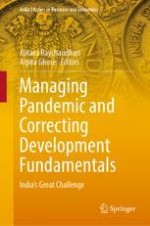2023 | OriginalPaper | Buchkapitel
Public Expenditure Quality of States for Education and Health, Does Rationalisation of Grants Matter?
verfasst von : Vikas Dixit
Erschienen in: Managing Pandemic and Correcting Development Fundamentals
Verlag: Springer Nature Singapore
Aktivieren Sie unsere intelligente Suche, um passende Fachinhalte oder Patente zu finden.
Wählen Sie Textabschnitte aus um mit Künstlicher Intelligenz passenden Patente zu finden. powered by
Markieren Sie Textabschnitte, um KI-gestützt weitere passende Inhalte zu finden. powered by
